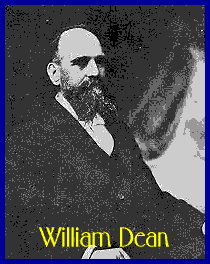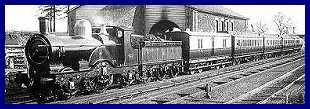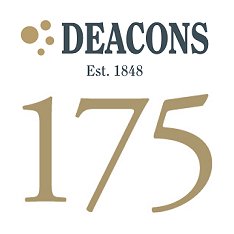William Dean
The Practical Genius
William Dean had been Armstrong's assistant even before they both served the GWR, had followed him to Swindon in 1864 and was in many respects cast in the same mould.
Like Armstrong and, indeed, Gooch before him, Dean had an acute awareness of his duty towards the men under him and was a champion of their causes. He filled the void in public affairs left by Armstrong's death by applying himself "with extreme vigour".
So continued a remarkable relationship between management and staff that was again to be the cornerstone of the advance of Swindon Works between 1877 when Dean took control, and 1902, when he retired. The intervening years saw the continued enhancement of Swindon's now worldwide reputation for efficiency even though the rest of the country was struggling through the 'Great Depression'. He inherited the complicated broad-versus-narrow gauge question which forced him to build 'convertibles' (narrow gauge rolling stock temporarily converted to run on the broad gauge). By 1892 the ghost of the broad gauge was finally given up and the whole network converted to narrow gauge (almost literally overnight) in 1892. It is hardly surprising, then, that Dean is remembered as the great moderniser. His attitude was typified by his instant decision to provide cabs for engine drivers - something that Armstrong had steadfastly refused to do because he said open footplates prevented drowsiness.
Innovation and expansion had been the theme of Armstrong's years in control of the GWR, but Dean was another engineering genius, and ready to take it into a new age.
It was while Dean was in charge that driving wheels of 6ft, 8.5 inches diameter were introduced, which were to become a favourite on the GWR. Dean also gave GWR locomotives increased cylinder sizes and its carriages the first lavatories and electric lights.
In fact, he heralded a new era of passenger comfort and it was his design that gave Britain probably its favourite railway institution - the corridored train, complete with heating (as pictured, pulled by a Dean locomotive).
In terms of the locomotives, his most enduring product was the workhorse of the GWR, the 'Dean Goods'. Actually no great innovation since they were already familiar during Armstrong's reign, Dean's modernised versions were sound enough for them to see the company through to the 1920s and beyond. Many were even still serving abroad during the Second World War.
Dean's final years as the leading figure at Swindon Works were marked by a sad period when his mental capacities were failing and his memory was becoming unreliable. He remained until 1902, but it was clear to everybody in Swindon that for some time the reins had effectively been passed to George Jackson Churchward, who would lead Swindon through 'The Glorious Years'.
Dean's period in charge at Swindon may not have been quite so glorious, but they were gloriously practical.
"His hallmark is to be found in the extreme simplicity, power, economy, ruggedness and easy maintenance of the major classes he designed, and among them are some of the finest engines ever to emanate from Swindon," remarks Alan S Peck, writer of the definitive history of Swindon Works. The fact that he is best remembered for improvements to carriage and goods aspects of railways rather than the more glamorous area of mainline services pulled by romantic engines, should not detract from his status in Swindon's railway and social heritage. Dean fully deserves his place right alongside greats like Gooch and Armstrong before him or Churchward and Collett after him.
• With the exception of Sir Daniel Gooch, William Dean was the GWR's longest-serving locomotive superintendent/chief mechanical engineer, having held the post for 25 years between 1877 and 1902. He was also the first to be a Justice of the Peace - a responsibility shared by all of his successors. • Dean retired to a house in Folkestone which had been bought for him by the GWR. He died there three years later, in his 66th year. • Dean's personal life was a tragic one. His first wife died soon after the birth of their third child and his second wife died in 1889 after 11 years of marriage. He outlived both his daughters - one dying in infancy. • Born in January, 1840, in London, Dean was fractionally older than Swindon Works. He was just 37-years-old when he succeeded Joseph Armstrong in 1877, assuming control of a workforce of 13,000 (not all of them at Swindon). • Although Dean's locomotives "showed no great departure from established practice" according to a history of the GWR, they were substantially more efficient, increasing boiler pressure by 43 per cent and adhesive weight by a staggering 270 per cent. • William Dean is commemorated today through the naming of Dean Street, in the shadow of the former Railway Works site. He had the unusual distinction of having the street named after him during his own lifetime. It was built in 1890 - 15 years before Dean's death. |
|
||||||||
|
||||||||
|
||||||||
|
||||||||
|
||||||||
|
||||||||
|
||||||||
|
||||||||



















